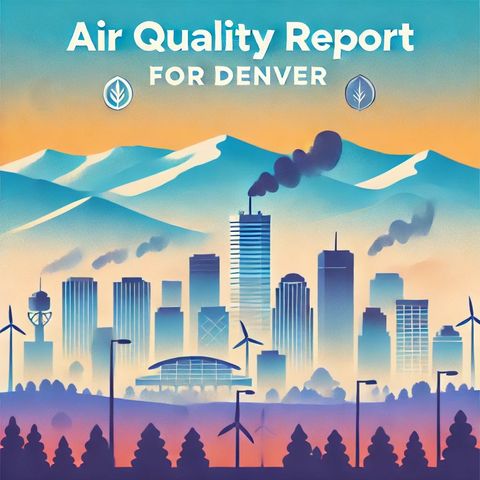Denver Air Quality Fluctuates Amidst Environmental Factors
Oct 1, 2024 ·
3m 31s

Download and listen anywhere
Download your favorite episodes and enjoy them, wherever you are! Sign up or log in now to access offline listening.
Description
Today’s air quality in Denver has become a notable topic of discussion, especially as the city continues to experience fluctuations due to various environmental factors. As of this morning, the...
show more
Today’s air quality in Denver has become a notable topic of discussion, especially as the city continues to experience fluctuations due to various environmental factors. As of this morning, the Air Quality Index, or AQI, in Denver is reported to be in the moderate range. The AQI is a standardized system used worldwide to gauge the cleanliness of the air and its potential health effects, measuring pollutants including ground-level ozone, particulate matter, carbon monoxide, sulfur dioxide, and nitrogen dioxide.
The primary contributors to Denver's current air quality include vehicle emissions, industrial activities, and construction dust. Seasonal factors also play a significant role; during the summer months, the presence of wildfire smoke from surrounding regions often exacerbates the air quality situation. This week, winds have brought in smoke from wildfires in neighboring states, causing a noticeable increase in particulate matter levels. However, cooler temperatures and recent efforts to curb emissions have helped keep the air quality within moderate levels, rather than spiking to unhealthy ranges.
Residents of Denver are advised to be mindful of their outdoor activities, especially those with existing respiratory conditions such as asthma or chronic bronchitis. On moderate AQI days, sensitive groups could still experience difficulties when engaging in sustained physical exertion outdoors. Wearing masks designed to filter out fine particulates can offer some protection, and monitoring local air quality reports is recommended to stay informed about current conditions.
In response to air quality challenges, Denver has implemented several measures aimed at reducing emissions and improving overall air quality. The city has increased its investment in public transportation, encouraging residents to use buses, light rail, and cycling options to reduce the number of vehicles on the road. Additionally, programs promoting electric vehicles and renewable energy sources are gaining momentum, reflecting Denver's commitment to achieving cleaner air.
Denver's natural geography complicates air quality management, given the city's location in a basin that can trap pollutants. This phenomenon, called the Denver Brown Cloud, has been a recurring issue, especially during winter months due to temperature inversions. Despite these challenges, ongoing monitoring and environmental policies are essential in mitigating the impact on public health.
Environmental groups and government agencies continue to collaborate on solutions to improve air quality in Denver. Public awareness campaigns and educational initiatives aim to inform residents about the importance of reducing pollution and protecting air quality. With these combined efforts, the city hopes to maintain acceptable air quality levels and safeguard the health of its inhabitants.
Overall, while Denver experiences variable air quality challenges, efforts by the community, city planners, and environmental groups show promise in creating a cleaner, healthier future for its residents. Keeping informed about daily air quality indices and taking proactive measures can help everyone contribute to this goal.
show less
The primary contributors to Denver's current air quality include vehicle emissions, industrial activities, and construction dust. Seasonal factors also play a significant role; during the summer months, the presence of wildfire smoke from surrounding regions often exacerbates the air quality situation. This week, winds have brought in smoke from wildfires in neighboring states, causing a noticeable increase in particulate matter levels. However, cooler temperatures and recent efforts to curb emissions have helped keep the air quality within moderate levels, rather than spiking to unhealthy ranges.
Residents of Denver are advised to be mindful of their outdoor activities, especially those with existing respiratory conditions such as asthma or chronic bronchitis. On moderate AQI days, sensitive groups could still experience difficulties when engaging in sustained physical exertion outdoors. Wearing masks designed to filter out fine particulates can offer some protection, and monitoring local air quality reports is recommended to stay informed about current conditions.
In response to air quality challenges, Denver has implemented several measures aimed at reducing emissions and improving overall air quality. The city has increased its investment in public transportation, encouraging residents to use buses, light rail, and cycling options to reduce the number of vehicles on the road. Additionally, programs promoting electric vehicles and renewable energy sources are gaining momentum, reflecting Denver's commitment to achieving cleaner air.
Denver's natural geography complicates air quality management, given the city's location in a basin that can trap pollutants. This phenomenon, called the Denver Brown Cloud, has been a recurring issue, especially during winter months due to temperature inversions. Despite these challenges, ongoing monitoring and environmental policies are essential in mitigating the impact on public health.
Environmental groups and government agencies continue to collaborate on solutions to improve air quality in Denver. Public awareness campaigns and educational initiatives aim to inform residents about the importance of reducing pollution and protecting air quality. With these combined efforts, the city hopes to maintain acceptable air quality levels and safeguard the health of its inhabitants.
Overall, while Denver experiences variable air quality challenges, efforts by the community, city planners, and environmental groups show promise in creating a cleaner, healthier future for its residents. Keeping informed about daily air quality indices and taking proactive measures can help everyone contribute to this goal.
Information
| Author | QP-5 |
| Organization | William Corbin |
| Website | - |
| Tags |
Copyright 2024 - Spreaker Inc. an iHeartMedia Company
